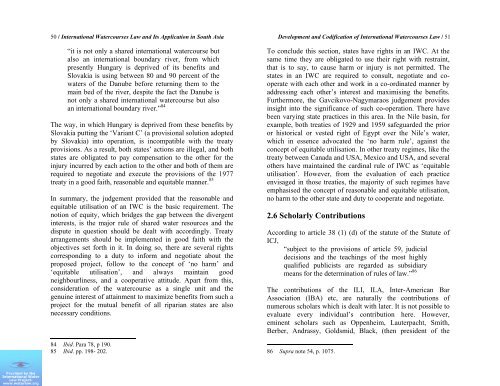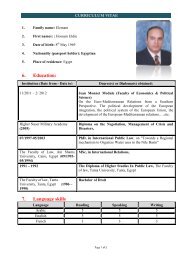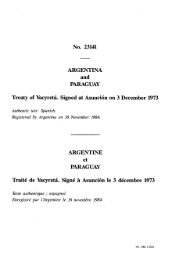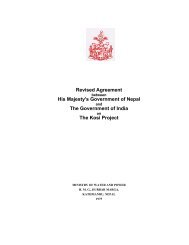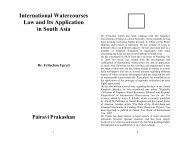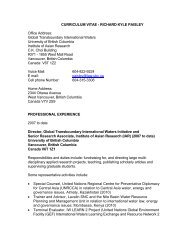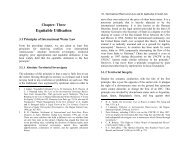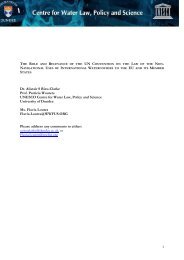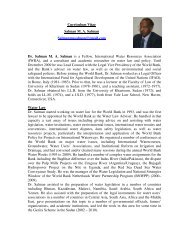Upreti, Trilochan, International Watercourses Law and Its Application ...
Upreti, Trilochan, International Watercourses Law and Its Application ...
Upreti, Trilochan, International Watercourses Law and Its Application ...
Create successful ePaper yourself
Turn your PDF publications into a flip-book with our unique Google optimized e-Paper software.
50 / <strong>International</strong> <strong>Watercourses</strong> <strong>Law</strong> <strong>and</strong> <strong>Its</strong> <strong>Application</strong> in South Asia Development <strong>and</strong> Codification of <strong>International</strong> <strong>Watercourses</strong> <strong>Law</strong> / 51“it is not only a shared international watercourse butalso an international boundary river, from whichpresently Hungary is deprived of its benefits <strong>and</strong>Slovakia is using between 80 <strong>and</strong> 90 percent of thewaters of the Danube before returning them to themain bed of the river, despite the fact the Danube isnot only a shared international watercourse but alsoan international boundary river.” 84The way, in which Hungary is deprived from these benefits bySlovakia putting the ‘Variant C’ (a provisional solution adoptedby Slovakia) into operation, is incompatible with the treatyprovisions. As a result, both states’ actions are illegal, <strong>and</strong> bothstates are obligated to pay compensation to the other for theinjury incurred by each action to the other <strong>and</strong> both of them arerequired to negotiate <strong>and</strong> execute the provisions of the 1977treaty in a good faith, reasonable <strong>and</strong> equitable manner. 85In summary, the judgement provided that the reasonable <strong>and</strong>equitable utilisation of an IWC is the basic requirement. Thenotion of equity, which bridges the gap between the divergentinterests, is the major rule of shared water resources <strong>and</strong> thedispute in question should be dealt with accordingly. Treatyarrangements should be implemented in good faith with theobjectives set forth in it. In doing so, there are several rightscorresponding to a duty to inform <strong>and</strong> negotiate about theproposed project, follow to the concept of ‘no harm’ <strong>and</strong>‘equitable utilisation’, <strong>and</strong> always maintain goodneighbourliness, <strong>and</strong> a cooperative attitude. Apart from this,consideration of the watercourse as a single unit <strong>and</strong> thegenuine interest of attainment to maximize benefits from such aproject for the mutual benefit of all riparian states are alsonecessary conditions.84 Ibid. Para 78, p 190.85 Ibid. pp. 198- 202.To conclude this section, states have rights in an IWC. At thesame time they are obligated to use their right with restraint,that is to say, to cause harm or injury is not permitted. Thestates in an IWC are required to consult, negotiate <strong>and</strong> cooperatewith each other <strong>and</strong> work in a co-ordinated manner byaddressing each other’s interest <strong>and</strong> maximising the benefits.Furthermore, the Gavcikovo-Nagymaraos judgement providesinsight into the significance of such co-operation. There havebeen varying state practices in this area. In the Nile basin, forexample, both treaties of 1929 <strong>and</strong> 1959 safeguarded the prioror historical or vested right of Egypt over the Nile’s water,which in essence advocated the ‘no harm rule’, against theconcept of equitable utilisation. In other treaty regimes, like thetreaty between Canada <strong>and</strong> USA, Mexico <strong>and</strong> USA, <strong>and</strong> severalothers have maintained the cardinal rule of IWC as ‘equitableutilisation’. However, from the evaluation of each practiceenvisaged in those treaties, the majority of such regimes haveemphasised the concept of reasonable <strong>and</strong> equitable utilisation,no harm to the other state <strong>and</strong> duty to cooperate <strong>and</strong> negotiate.2.6 Scholarly ContributionsAccording to article 38 (1) (d) of the statute of the Statute ofICJ,“subject to the provisions of article 59, judicialdecisions <strong>and</strong> the teachings of the most highlyqualified publicists are regarded as subsidiarymeans for the determination of rules of law.” 86The contributions of the ILI, ILA, Inter-American BarAssociation (IBA) etc, are naturally the contributions ofnumerous scholars which is dealt with later. It is not possible toevaluate every individual’s contribution here. However,eminent scholars such as Oppenheim, Lauterpacht, Smith,Berber, Andrassy, Goldsmid, Black, (then president of the86 Supra note 54, p. 1075.


